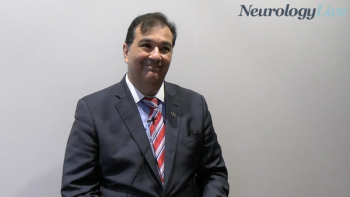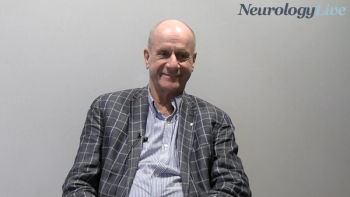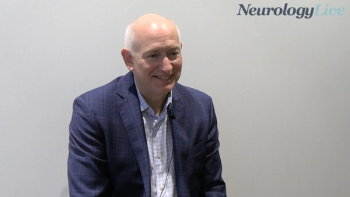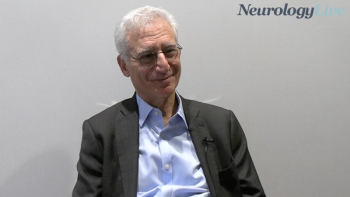
The data scientist at Roche and mother of a child living with Lennox-Gastaut syndrome, provided insight on areas of the disease that need greater recognition, as well as an overview of how the disease is currently treated. [WATCH TIME: 4 minutes]

The data scientist at Roche and mother of a child living with Lennox-Gastaut syndrome, provided insight on areas of the disease that need greater recognition, as well as an overview of how the disease is currently treated. [WATCH TIME: 4 minutes]

At week 25 of treatment with trontinemab, patients demonstrated decreases in CSF total tau, CSF p-tau181, and CSF neurogranin.

The senior director of research strategy at Banner Alzheimer’s Institute talked about improving clinical trial diversity through removal of logistical barriers, creating inclusive outreach strategies, and designing trials that address the unique needs of underrepresented populations. [WATCH TIME: 5 minutes]

Bruce Leuchter, MD, president and chief executive officer at Neurvati Neurosciences, provided clinical insight on the newly initiated Astroscape trial of radiprodil for the treatment of tuberous sclerosis complex and focal cortical dysplasia type II.

Here's some of what is coming soon to NeurologyLive® this week.

The director of the Banner Sun Health Research Institute talked about how the newly approved Alzheimer treatments have shown promise in slowing clinical decline, signaling a foundational shift toward disease-modifying therapies that target core biological processes. [WATCH TIME: 5 minutes]

Amy Tsou, MD, MSc, program director at the National Institutes of Neurological Disorders and Stroke, discussed the increasing cost of prescription drugs in the US and its impact on healthcare providers, including those who treat patients with neurologic conditions.

Test your neurology knowledge with NeurologyLive®'s weekly quiz series, featuring questions on a variety of clinical and historical neurology topics. This week's topic is on GBA1-associated Parkinson disease.

Over a 24-week period, comprising both the core study and extension trial, the incidence of treatment-emergent adverse events was infrequent, with less occurring over the long-term extension.

The professor of molecular geriatrics at Uppsala University talked about the research journey that led to the development of targeted antibody therapies for Alzheimer disease and emphasized the need for early diagnosis. [WATCH TIME: 5 minutes]

Neurology News Network. for the week ending November 2, 2024. [WATCH TIME: 4 minutes]

The chair of psychiatry at Tufts University School of Medicine talked about a recent study that suggested synthetic tetrahydrocannabinol could reduce agitation in patients with advanced Alzheimer disease. [WATCH TIME: 5 minutes]

Take 5 minutes to catch up on NeurologyLive®'s highlights from the week ending November 1, 2024.

Ahead of International LGS Awareness Day, Melanie Huntley, PhD, a data scientist for Roche and mother of child with Lennox-Gastaut syndrome, shed light on the realities of living with LGS, emphasizing the need for greater awareness of the condition’s impact.

A subgroup analysis of the phase 3 Clarity AD open-label extension study showed a 14% increased amyloid plaque removal with subcutaneous lecanemab vs intravenous administration, the administration for which it was FDA-approved for.

The senior clinical research scientist at Acumen Pharmaceuticals talked about the company's approach to refining Alzheimer screening by implementing plasma p-tau 217 biomarkers. [WATCH TIME: 5 minutes]

Mind Moments®, a podcast from NeurologyLive®, brings you an exclusive interview with Lawrence Robinson, MD. [LISTEN TIME: 15 minutes]

LX1001, an AAV gene therapy, was considered safe and well tolerated, with no events of amyloid-related imaging abnormalities (ARIA) observed.

The head of dementia research at Austin Health and the chief medical officer at Cognition Therapeutics talked about recently presented phase 2 findings on CT1812, an investigational medicine for patients with mild to moderate Alzheimer disease, at CTAD 2024. [WATCH TIME: 5 minutes]

In total, more than half of the screened population failed by not meeting plasma p-tau217 criteria and of the remaining, most participants were not in the intermediate tau PET range.

The cofounder and chief science officer of the Alzheimer's Drug Discovery Foundation talked about how Alzheimer disease treatment may evolve through combination therapies, adding potential anti-tau and anti-inflammatory agents to improve patient outcomes. [WATCH TIME: 5 minutes]

Insulin treatment significantly increased beneficial plasma biomarkers, including SNAP25, SMOC1, BDNF, and VCAM1.

The indication lead of neurology at Roche Diagnostics International talked about the latest Alzheimer biomarkers that are aimed to transform diagnostic accuracy and accessibility as well as enhance early detection and treatment. [WATCH TIME: 5 minutes]

The rare disease population health strategy lead at UCB provided clinical insight on some of the unique challenges of diagnosing myasthenia gravis, and some of the early signs clinicians and non-specialists should look out for. [WATCH TIME: 3 minutes]

The multicenter, randomized, double-blind, placebo-controlled, parallel-group, event-driven trial will use time to clinical progression, defined as an increase in Clinical Dementia Rating score, as the primary end point.

A trio of experts talked about Lexeo Therapeutics’ LX1001 gene therapy trial that demonstrated promising safety and biomarker effects in patients with early-stage Alzheimer disease. [WATCH TIME: 5 minutes]

The chief medical officer at Cognito Therapeutics talked about a medical device designed to slow cognitive decline in patients with Alzheimer disease through gamma frequency brain stimulation. [WATCH TIME: 6 minutes]

Compared with the standard dosing arm, those on an enhanced titration dosing of donanemab demonstrated a 41% reduction in the relative risk of ARIA-E.

The director of Child Neurology and Pediatric Sleep Medicine at Geisinger Janet Weis Children's Hospital talked about how the recent approval of once-nightly sodium oxybate for pediatric narcolepsy enables more effective and manageable treatment options for children and families.

Despite a small cohort sample size, treated patients with E2814 demonstrated significant reductions in p-tau217 after 12 weeks of treatment, sustained through the 108-week time point.